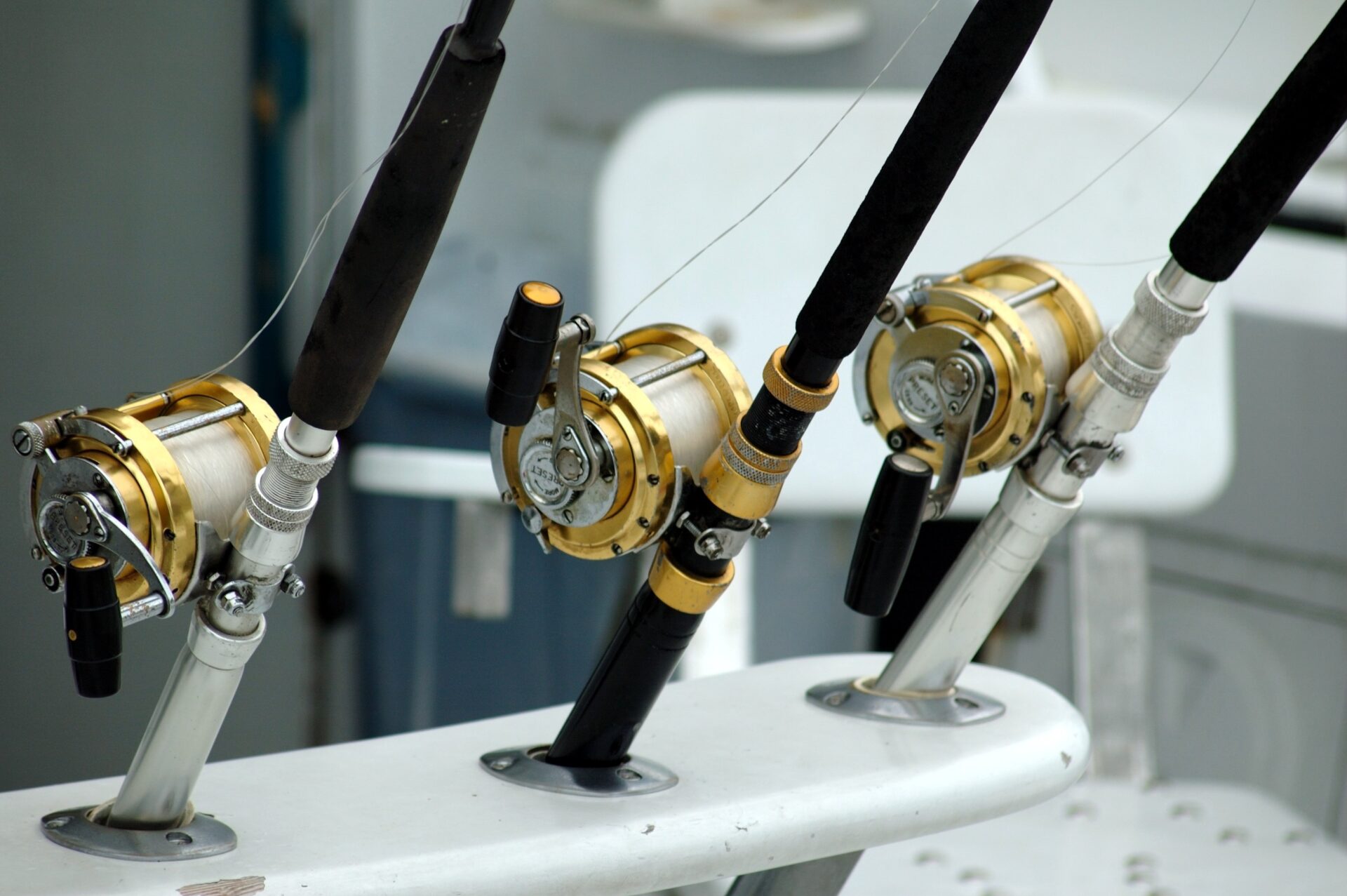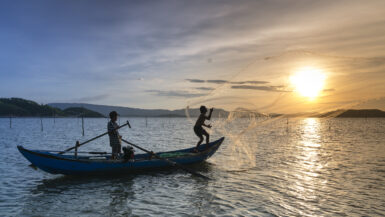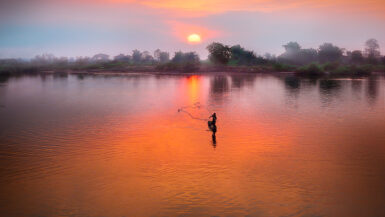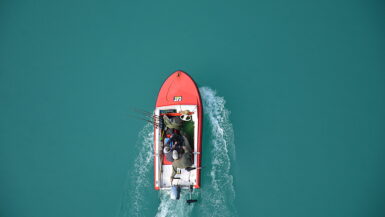As a recreational freshwater angler, staying informed of the laws and regulations governing your activity is vital to preserving the sport and keeping you out of trouble with the authorities. Knowing what is expected of you and what the appropriate limits are will keep you in compliance with the state and local laws, ensuring that the fish and their environment remain protected. In this article, we will discuss the common fishing laws and regulations that freshwater anglers need to be aware of before they even cast their lines.
Freshwater Fishing Restrictions
Freshwater fishing is typically regulated more extensively than saltwater fishing, due to the greater human impact on inland bodies of water. Anglers are expected to adhere to any and all local, state, and federal regulations for freshwater fishing.
Size Restrictions on Freshwater Fish
Size restrictions for freshwater fish vary greatly from region to region, and depend on the type of fish being caught. Typically, anglers must adhere to certain length and weight requirements when catching various types of freshwater fish. Many states also have “slot limits” in place which put a size limit on the fish caught, with any fish under or over the designated size having to be immediately released. It is important for anglers to know and adhere to any size restrictions or slot limits that may be in place.
Gear Restrictions on Freshwater Fishing
The type of gear used when freshwater fishing can be strictly regulated by law. Anglers may be restricted to using artificial lures and/or a certain type of bait or method of fishing. Additionally, any motorized vessels must adhere to any restrictions or special licensing requirements that may be in place.
Catch and Release Limits for Freshwater Fishing
Catch and release fishing is becoming increasingly popular with freshwater anglers, as it helps to conserve fish stocks and maintain healthy populations. Many states have limits in place restricting the number of fish that can be kept, with any additional fish needing to be released. It is important for anglers to understand and adhere to any catch and release limits that may be in place.
Designated Fishing Areas for Freshwater Angling
Certain bodies of water may be open to fishing, while others may be closed to protect the local fish populations. Anglers must be aware of any designated fishing areas and may be subject to fines if they are found fishing in areas where they are not permitted to do so. It is also important to note that many lakes and rivers may be open to fishing, but have restrictions in place for certain types of fishing gear or methods.
Freshwater Fishing Licenses
Anglers must obtain a fishing license before they can legally engage in freshwater fishing. Licenses can be obtained from local bait and tackle shops, outdoor stores, or through state agencies. Fishing licenses usually cost a small fee, and may need to be renewed annually or every few years. It is important for anglers to obtain a valid fishing license as failure to do so could result in fines or other penalties.
Fishing License Requirements
Fishing licenses are required for anyone looking to fish in freshwater. The type of license required differs by state and the type of fish being fished for. In many states, there are separate licenses for fishing different species such as trout, bass, and walleye. Additionally, some states offer multi-species licenses that cover more than one type of fish.
Where Can I Buy a Fishing License?
Fishing licenses can be obtained from most sporting goods stores, saltwater and freshwater bait and tackle shops, and some supermarkets and convenience stores. In some states, fishing licenses can be purchased online or by phone. Be sure to check your state laws and regulations to find out what type of license you need and where to get it.
What Details are Required When Buying a Fishing License?
When purchasing a fishing license, buyers will typically need to provide their name, address, age, and driver’s license number. Additionally, some states require anglers to provide information about their residency status, fishing activity, and any previous licenses they have held.
What Are the Fees Associated With Fishing Licenses?
Fishing licenses come with various fees depending on the type of license required, the length of the license, and other factors. For example, some states may offer annual licenses for a reduced rate, while others may offer multi-year licenses which come with a discounted rate. It also important to remember that some states have special license fees for those under 16 or over 65 years of age.
How Long Is the Fishing License Valid For?
The length of time a fishing license is valid for will depend on the type of license you have purchased. In most states, licenses are valid for a full year from the date they are issued. It is important to regularly review the expiration date on your license and renew before it expires.
Do I Need a License to Fish on My Own Private Property?
In some states, a fishing license is still required when fishing on private property. Be sure to check your state’s regulations to find out if you need a license before fishing on any private property. Additionally, it is important to note that many states require a license even if you are fishing with a rented pole or rented boat.
What Other Regulations Should I Be Aware Of?
In addition to having a valid fishing license, there are other regulations that freshwater anglers need to be aware of. Rules and regulations vary depending on the state and type of fish being fished for, so it is important to review all local, state, and federal laws to make sure you are following the proper regulations. Additionally, some bodies of water may have specific regulations that must be followed while fishing, so be sure to read any signs posted in the area.
Gear and Tackle Restrictions
Fishing laws and regulations vary from state to state, but all states have some restrictions on gear and tackle that can be used to fish in freshwater. In general, fishing gear with more than one hook is illegal, and only one line with a single hook may be used per person. Other gear that is restricted or prohibited includes, but is not limited to, snagging gear, multiple baited hooks, trotlines, set-lines, limb lines, and the use of live or dead minnows or other bait fish.
Size and Quantity Restrictions
Many states have restrictions on the size of fish that can be kept, as well as limits on the number of fish that can be taken from a particular body of water. For example, some states may have a minimum size for bass, trout, or catfish, while others may put a limit on the total number of fish that can be taken in a day (usually 5-10). In some cases, a special permit may be required to bag a larger catch.
Time and Season Restrictions
Most states have special fishing laws that apply to certain bodies of water, such as when fishing is allowed and what type of tackle can be used. In addition, many states have special regulations to protect certain species at certain times of the year, such as during spawning seasons. Some states may also have restrictions on when and where night fishing is allowed.
Limits on Artificial Lures
Most states place restrictions on artificial lures as well, such as the type and number of lures allowed per person. Some states also restrict the use of live bait, particularly with regard to certain species. Depending on the state, some bodies of water may have specific restrictions or prohibitions on the use of certain lures or baits.
Laws and Regulations for Fish Tagging
In some states, anglers must tag their catch before releasing them back into the water. This is usually done to track the population and health of fish in certain areas. Anglers should familiarize themselves with the fishing laws and regulations of their state to ensure compliance with fisheries management regulations.
Rules for Transporting Fish
Anglers must also take into consideration any laws or regulations regarding the transport of their catch. In some states, it is illegal to transport live fish out of state, or to have more than the prescribed limit in possession. Before traveling with fish, anglers should check to make sure they are abiding by the regulations of the state they are in.
Fishing Zones and Times
When it comes to freshwater fishing, anglers should be aware of the various fishing zones and the regulations in place for each zone. Fishing zones are generally put in place to conserve fish populations, protect sensitive areas, and manage fishing pressure. Many zones are seasonal and are also determined by the type of fish that is being targeted.
Freshwater Fishing Time Regulations
In addition to fishing zones, anglers must also be aware of time regulations for freshwater fishing. Generally, each body of water or region will have specific times for when fishing activity is allowed or restricted. In some areas, this could be a daily or yearly time limit. It is important for anglers to check their local regulations and make sure they are following the rules.
Size and Bag Limits
Anglers should also be aware of size and bag limits as they relate to freshwater fishing regulations. In most places, there will be a minimum size limit on the types of fish you can keep. This is to ensure that only adult fish are being taken and that the fish population is being environmentally managed. Additionally, most areas will have bag limits in place to prevent over-fishing.
Gear Regulations
In addition to the other regulations, anglers should also be aware of any gear restrictions in place in their local area. Some areas have regulations on the type of bait or lures that can be used, or restrictions on the number of hooks or lines being used. Anglers should make sure to read up on the gear requirements for any body of water they plan to fish in.
Stay Informed
As with any form of recreational activity, it is important for anglers to stay informed about their local laws and regulations. This includes becoming familiar with the fishing zones, time and size limitations, and gear restrictions that are in place for any body of water they plan to fish in. By understanding the regulations, anglers can ensure they are fishing responsibly and respectfully.
Catch and Release Regulations
Freshwater anglers must comply with all fishing regulations, including catch and release regulations, in order to protect and preserve the natural resources that they are fishing in. Responsibilities of fishermen include releasing all species of fish unharmed and releasing all fish caught immediately. This rule applies regardless of the size or species of fish. In addition, fishermen must ensure that hooks are barbless or, if barbed hooks are used, that they are carefully removed so as not to harm the fish.
Catch and Release Areas
Some bodies of water have catch and release regulations in place. In these areas, fishers are required to release all fish caught immediately, regardless of size or species. State authorities may designate some areas as catch and release only, and fishing in those areas is subject to stricter penalties. It is important for anglers to check the local regulations to ensure that they are aware of any catch and release areas.
Helpful Tips for Catch and Release Regulations
When practicing a catch and release technique, anglers should take extra precautions to ensure the successful release of the fish. Tips for successful catch and release include wetting your hands while handling a fish, minimizing the time out of the water, avoiding squeezing the fish, and removing the hook gently. It is also important to never discard fishing line, lures, or other gear into the water, as this could cause injury or death to fish.
Benefits of Catch and Release Regulations
Catch and release fishing is a great way to increase fish populations and to ensure that fish resources remain healthy. By releasing the fish, anglers are allowing the fish to reproduce and thus contribute to the growth of the population. Furthermore, catch and release fishing allows for fishing to continue for future generations, preserving the environment and ensuring sustainable fisheries.
Misc. Laws and Regulations
In order to protect the local environment and the fish species, anglers must obey multiple environmental regulations when fishing. These can include, such as local and state catch limits, size limits, bait restrictions, and equipment restrictions. Local laws and regulations should always be consulted regarding the specific rules for fishing.
Respecting Private Property
Anglers must respect the property rights of private landowners. Fishing on posted private property or without permission on unposted land is illegal in most jurisdictions. In addition, local authorities generally have the right to restrict or ban fishing on public land. It’s important to be aware of the fish and wildlife regulations when fishing on a public body of water.
Licensing Requirements
Most states require anglers to have a valid fishing license before they can lawfully fish. The regulations vary from state to state, so anglers should check their local regulations to make sure they are complying with the law. Licenses are typically available from local bait shops or online.
Equipment and Gear
Anglers must use the appropriate fishing gear for the type of fish they are trying to catch. This includes the type of rod, reel, line, and tackle to be used. It is also important to remember that some states restrict the use of certain types of fishing gear, so anglers should check the local laws before using certain types of equipment.
Fish Conservation
Anglers must adhere to catch limits and size limits in order to help preserve fish populations. Local laws and regulations should be consulted to determine the specific regulations that apply to the bodies of water being fished. In addition, anglers must release all protected fish unharmed to help promote healthy fish populations.
Fishing Safety
Anglers should follow all safety guidelines when fishing. This includes using the proper personal protective equipment and following water safety regulations. It is also important to have proper communication and navigational devices to help prevent accidents.
Staying up-to-date on Regulations
The laws and regulations governing freshwater fishing can change on a regular basis. It’s important to stay up-to-date on any changes or applicable laws in order to remain compliant. The state, regional and local governments all have their own laws and regulations on freshwater fishing. An angler should familiarize themselves with the various regulations to ensure a safe and legal fishing experience. Additionally, anglers will need to obtain any necessary permits, licenses or registrations before fishing. Finally, it’s important for anglers to always fish responsibly and respect the environment, as well as other anglers. Fishing is a great recreational activity that needs to be enjoyed responsibly for it to be sustainable and for future generations to experience it.





Leave a reply